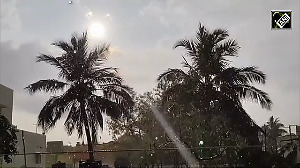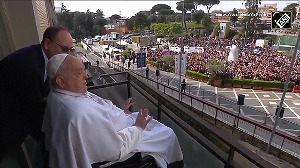The squabbles we are seeing today over the election of the next President will be nothing compared to the all-out war ignited by a fragmented verdict after the 2014 general election, feels T V R Shenoy.
If George Orwell were alive today he might have written: 'All MPs are equal. Some MLAs are more equal than others.'
The vice-president of India is chosen by members of Parliament. But the Constitution mandates that members of legislative assemblies have a say in choosing the President.
That fact is giving the party managers in both the Congress and BJP some sleepless nights. Tough as it is to get the numbers in Parliament it is tougher yet to do in the Vidhan Sabhas, where the Congress and the BJP might not even have a majority, might not even be the chief Opposition party. Even the smallest parties, allies or not, will need to be cajoled.
'UPA' stands for 'United Progressive Alliance'. 'NDA' stands for 'National Democratic Alliance'. The truth is that neither is a cohesive alliance.
Let us start with the BJP side of the ledger, if only because it is a bit simpler than untangling the Congress's side.
Sushma Swaraj, the Leader of the Opposition in the Lok Sabha, shot down both names floated by the Congress for the Presidency, those of Union Finance Minister Pranab Mukherjee and Vice-President Hamid Ansari. This was expected.
The finance minister is still a practising Congress politician, someone the BJP finds difficult to support. The vice-president drew the ire of the entire Opposition -- not just the BJP -- after the Lokpal Bill debate in the Rajya Sabha on December 29, 2011. (Ansari abruptly adjourned the House sine die after disturbances carried the sitting to midnight, December 30, when the session was to end.)
Sushma Swaraj added a rider: 'If a name is supported by Mamata Banerjee and Sharad Pawar, we will support it. If Mulayam Singh Yadav takes Kalam's name, then we can respond favourably.'
Nitish Kumar and his Janata Dal-United immediately disowned this. Does Nitish Kumar believe that Hamid Ansari, who could not control proceedings in the Rajya Sabha, possesses the stature to be President of India?
The chief minister of Bihar is making a fairly transparent bid to become prime minister of a broadly-NDA coalition in 2014, and part of the game plan calls for bullying the larger BJP into submission. Step One consisted of holding gala Bihar Day celebrations in Mumbai and then in Delhi, and what we are seeing is Step Two.
Things are just as murky on the other side of the fence. Read that statement by Sushma Swaraj again. She was saying two things. First, the Congress needs the Trinamool Congress, the Nationalist Congress Party, and the Samajwadi Party to get its nominee elected. Second, the BJP will happily play ball with those three parties to embarrass the Congress.
How much clout, exactly, do the smaller parties have?
Article 54 of the Constitution seems simple: 'The President shall be elected by the members of an electoral college consisting of (a) the elected members of both Houses of Parliament; and (b) the elected members of the Legislative Assemblies of the States." ['States' includes the National Capital Territory of Delhi and the Union Territory of Puducherry, but not the other Union Territories, which are represented only by their MPs.]'
As far as MPs go, the calculation is straightforward. Whether in the Rajya Sabha or the Lok Sabha, every elected MP's vote carries a weight of 708, which has been the case for every Presidential election since 1974, and which shall continue beyond 2026.
It is a story for another day but those interested can look up the Forty-Second Amendment, 1976 and the Eighty-Fourth Amendment, 2001.
(No, Sachin Tendulkar cannot vote; he is one of the twelve nominated MPs in the Rajya Sabha, and they -- like the two Anglo-Indian nominees in the Lok Sabha -- are obviously not elected.)
The complications arise with Article 55, which starts, 'As far as practicable, there shall be uniformity in the scale of representation of the different States at the election of the President.' The rest of Article 55 is too long to quote; essentially, the value of a vote cast by an MLA differs from one state to another because they have differing populations.
Article 55's prescribed formula starts with dividing the population of a state by one thousand. This is then divided by the number of MLAs in the assembly. That yields the weight of a vote cast by an MLA from a given state.
Obviously, a vote by MLAs from larger states counts for more than those by MLAs from smaller units. This is why Mulayam Singh Yadav, Sharad Pawar, and Mamata Banerjee are so important. Their MLAs are in states with large populations, namely Uttar Pradesh, Maharashtra, and West Bengal.
The value of a vote by a West Bengal MLA is currently fixed at 151. The value of a vote by a Maharashtra MLA is 175. And the value of a vote by an Uttar Pradesh MLA is 208. For those keeping count, the value of a vote by a Bihar MLA is 173.
Following the recent polls, the Samajwadi Party -- MPs plus MLAs -- carries a weight of over 68,000 votes.
The Trinamool Congress is worth about 48,000 votes.
The Nationalist Congress Party is worth about 24,000 votes. And Nitish Kumar's Janata Dal-United counts for about 42,000 votes.
Let me put that in percentages. The Congress by itself counts for approximately 30 per cent of the electoral college. The BJP by itself counts for approximately 21 per cent of the same body. This means that the two big parties must woo smaller parties. Mulayam Singh Yadav, Mamata Banerjee, Sharad Pawar, and Nitish Kumar can -- and will -- want something in return.
None of those four parties can match the Congress or the BJP when it comes to weight. The Samajwadi Party, by my rough calculation, is worth 6 per cent of the electoral college, both the Janata Dal-United and the Trinamool Congress are worth about 4 per cent and the NCP is even smaller.
This leaves out several other significant players. The Left Front counts for approximately 5 per cent of the electoral college, Mayawati's Bahujan Samaj Party counts for 4 per cent, and Naveen Patnaik's Biju Janata Dal counts for approximately 3 per cent.
The Congress hopes the UPA sticks together, meaning that Mamata Banerjee and Sharad Pawar fall in line. The Samajwadi Party and the BSP technically support the Manmohan Singh ministry. If the entire UPA stands together and if the weight of the Samajwadi Party and the BSP are thrown on its side, the vote share goes up to 51 per cent.
That can go up to 53 per cent if other supporting parties such as Lalu Prasad Yadav's Rashtriya Janata Dal, H D Deve Gowda's Janata Dal-Secular, and others are added.
But that figure falls from 53 per cent to 49 per cent if the 4 per cent commanded by Mamata Banerjee goes out of the equation. If the Trinamool Congress disagrees with the Congress's choice, Sonia Gandhi's party needs the Left Front's numbers, with immediate consequences in West Bengal and long-term consequences in Kerala.
If I have got the arithmetic correct, Mulayam Singh Yadav, Mamata Banerjee, Jayalalithaa, Naveen Patnaik, Nitish Kumar, and Sharad Pawar together carry slightly more weight in the electoral college than the BJP does -- but if and only if all six of them stand together.
Relations between the Congress and the Bharatiya Janata Party are so rancid that it is almost futile to consider the two reaching a consensus by themselves. This leaves the field open for all the smaller regional parties to extract their pound of flesh.
The worst part is that the continuing fragmentation of the two larger parties -- by extension, the fragmentation of the two 'alliances' -- shows no sign of reversing. The squabbles we are seeing today over the election of the next President will be nothing compared to the all-out war ignited by a fragmented verdict after the 2014 general election.
Remember that the President elected in 2012 may have the power to pick a prime minister in 2014.
Please read more columns by Mr Shenoy here.






 © 2025
© 2025